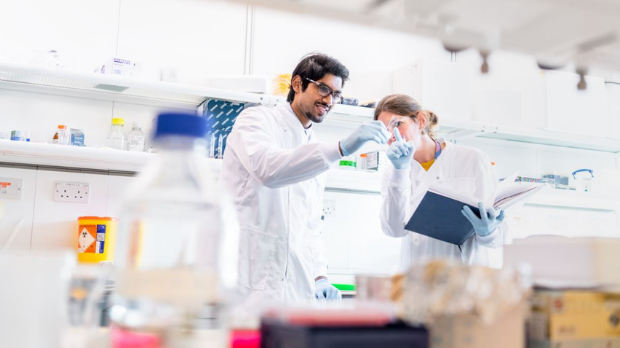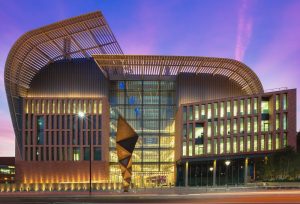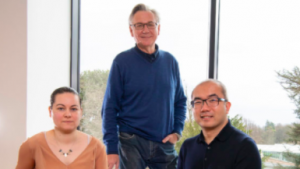Hear more ways philanthropists have helped projects by exploring Stories From Our Network.
5 times philanthropy helped change the course of cancer research
Philanthropy touches every area of British society. It is difficult to walk down a street without seeing a school, park or community facility which has been funded – at least in part – by a philanthropist. In few areas is this more clear than the field of medical research.
To celebrate the contribution private resources have made to this field, Cancer Research has compiled a list of 5 times philanthropy helped change the course of cancer research.
This article was written by Joanna Lewin, and was originally published by Cancer Research on World Cancer Day 2021. Access the original here.

– Written by Joanna Lewin –
Behind every one of our researchers is a supporter with a vision – whether that researcher is exploring cancer’s real-time in vitro evolution, studying how COVID-19 affects people with cancer or understanding why cancer develops in certain organs and not others.
This World Cancer Day, we’re reflecting on how far we’ve come in 19 years as the world’s largest charitable funder of cancer research. Put simply, we would never have got this far or made such giant leaps in our understanding of the disease had it not been for the generosity of our supporters. Here, we take a look at five times philanthropy led to transformational findings that are helping to save lives.
1. Co-funding Europe’s largest single-site biomedical research facility, the Francis Crick Institute
In November 2016, we invited a group of philanthropists to watch the Queen unveil the Francis Crick Institute in London, to which they had collectively contributed £100m. Since then, scientists at the institute – Europe’s largest biomedical research facility under one roof – have exceeded all expectations.
They’ve answered thousands of questions relating to the fundamental biology of human health and disease – from finding patterns in cancer evolution to revealing how HIV develops drug resistance and uncovering the fundamental biology of the novel coronavirus.
And they have just set up a COVID-19 vaccination hub to join their successful testing programme. The Crick’s work spans the full breadth of the research spectrum, from fundamental human biology to translational science, which takes discoveries in the lab and develops them into life-saving treatments. And through the ongoing generosity of our supporters, we’ll continue to facilitate vital scientific discoveries at the Crick for many years to come.
Who helped make it happen?
Two of the Crick’s founding philanthropists are James and Gemma Reynolds. They donated to our ‘Create the Change’ campaign to build the institute almost half a decade ago and recently pledged another five years of support.
“When my wife and I were invited on a tour of the Crick construction site, we walked through the labs and said to each other, cancer will be defeated in this building,” he says.
But the Crick is not just a building, it’s a living organism and adapts to its environment. Less than a year ago, nobody knew about COVID-19 and now the Crick’s researchers are leading on testing and research. And they did it at short notice, working day and night. It’s been truly amazing to see the impact the institute is having on society.”
2. Understanding cancer evolution in real-time with TRACERx
In 2014, we launched a new project that would help propel our understanding of cancer evolution in ways never imagined before. The nine-year, £12.5m study, named TRACERx (Tracking Cancer Evolution through therapy [Rx]), is the first ever longitudinal, large-scale study of lung cancer evolution, which means researchers can examine the complex process of cancer evolution as it occurs in vitro over time.
Thanks to sustained philanthropic funding, TRACERx researchers can now predict whose lung cancer will return after surgery by detecting tumour DNA in their blood and who may need additional therapy after surgery to help prevent the disease returning. They can also develop tests that use machine learning to predict clinical outcomes at the point of diagnosis. And they can use AI to chart regions in a tumour where immune cells are highly concentrated – vital knowledge, as it turns out, for predicting the outcome of someone with lung cancer.
Who helped make it happen?
As this unique project caught the attention of enthusiastic scientists up and down the country, so too did it capture the imagination of a group of visionary philanthropists who saw its abundant potential. Many of them still regularly donate to the project, with newer supporters joining along the way. Vanessa Marsland is a member of our Catalyst Club giving circle and was inspired to support TRACERx after hearing lead author and Cancer Research UK’s chief clinician, Professor Charles Swanton, speak at an event.
“I was very impressed by the project’s scale. I’m not sure other charities or organisations could support such a large initiative over time,” she says. “I’ve come to see over the years that it’s the long-term studies that will help more people survive cancer. The need to invest in cancer hasn’t gone away, but givers have been temporarily distracted by COVID-19. We need to look to the future and make sure progress can continue.”
3. Developing better treatments for people with pancreatic cancer with PRECISION-Panc
Survival for pancreatic cancer remains stubbornly low. Due to its tricky location and vague symptoms, it’s difficult to detect so is often diagnosed at a later stage when treatment options are limited. So, while survival is increasing for many cancers, for pancreatic cancer 10-year net survival is still just 1% – exactly the same today as it was in the 1970s. But researchers at the Cancer Research UK Beatson Institute in Glasgow have been working hard to buck this devastating trend.
In 2017, we committed £10m to a new study called PRECISION-Panc, which is accelerating our understanding of the disease to inform better, more personalised treatments. The most recent development came in October 2020, when the team announced they’d identified molecular markers that can predict which tumours will respond to certain drugs that target damaged DNA. The team took this discovery forward into a clinical trial late last year.
Who helped make it happen?
One of our longest-standing philanthropic supporters, Mike Jackson, has backed our work in Glasgow and Edinburgh for 14 years, and by doing so, has given rise to vital research like PRECISION-Panc.
“I’ve always been keen to support research in Scotland,” says Mike. “It’s important for the economy and the country that we continue to develop knowledge-based work. We have a history of advances in medicine and centres of excellence like the Beatson that deserve our support.”
Initially supporting bowel cancer research, Mike later decided to back research into pancreatic cancer.
“The disease is deadly because it’s so complex, and difficult to detect early and treat. To see signs of progress in understanding and treating pancreatic cancer is rewarding. You feel satisfaction that in some small way your support has contributed to the difference and progress being made by the researchers.”
Thanks to Mike and others like him, not only can researchers now study tumours in unprecedented detail to make more informed decisions around treatment, they’re also using what they’ve learnt to develop new treatments for people with pancreatic cancer.
4. Answering the riddle of tumour specificity
We know that different DNA mutations can cause different types of cancer, despite the fact that faulty genes can be found in nearly all our cells. For example, errors in the BRCA1 and BRCA2 genes are known to have a specific role in breast and ovarian cancer development – but why not in other organs? This long-standing mystery is now being unravelled by the SPECIFICANCER team through the Cancer Grand Challenges initiative – a global funding platform, founded by us and the US National Cancer Institute.
Led by Professor Stephen Elledge at Harvard Medical School and Brigham and Women’s Hospital, SPECIFICANCER researchers are carefully mapping our cells’ cancer drivers – molecules that are known to cause cancer – and their specificity to different tissues.
By scrutinising healthy cells from the eight tissue types that give rise to the most common cancers – breast, bowel, lung, skin, kidney, liver, brain and pancreas – the team hopes to identify whether certain genes are only active in different parts of the body. They’ll also introduce mutations into hundreds of genes to see which ones drive cancer in the different tissue types. By doing so, they hope to provide a complete overview of which genes and molecules play a role in driving cancer in different parts of the body.
Who helped make it happen?
This work is co-funded by us and the Mark Foundation for Cancer Research. The New York-based philanthropic organisation was set up by Alex Knaster in honour of his father, Mark, who died of cancer in 2014. In 2019, they donated £10m to the SPECIFICANCER project – their largest gift to a UK organisation to date – and Alex has been a passionate champion of the Cancer Grand Challenges initiative ever since.
“The Mark Foundation’s broad portfolio of cutting-edge research aimed at transforming the prevention, diagnosis, and treatment of cancer has exposed us to a wide spectrum of ways to achieve breakthroughs in cancer,” he explains. “Our Cancer Grand Challenges partnership expands our ability to support bold, large-scale science that will create positive change for patients and their loves ones, which is at the heart of our philanthropic mission.
By working together to support the SPECIFICANCER team’s efforts to understand why certain gene mutations cause cancer in some organs, but not in others, we’ll achieve even more impact in accelerating the pace of discovery and advancing our understanding of cancer to ultimately benefit patients and families everywhere.”
5. Unveiling crucial insights about the impact of COVID-19 on people with cancer
Due to the pandemic, many people with cancer have seen vital surgery and treatments delayed and been subject to harsher shielding measures, due to an assumption that someone with cancer will be at higher risk of the virus than someone without the disease. There’s also been uncertainty among health care providers about how to prioritise care for people with COVID-19 and a range of cancers.
Now, one team led by Cancer Research UK clinician scientist Dr Sheeba Irshad at King’s College London has provided helpful evidence to cut through this uncertainty. The SOAP study shows that people with a solid tumour cancer will mount a similar immune response to the virus than people without cancer, meaning they should clear the virus in the same way.
But while the findings provide reassurance to those with solid tumour cancers, they unfortunately also show that people with blood cancers face more difficulty in shaking off the virus. For some, it took 90 days after the first signs of infection – around five times the average recovery. The news, while deeply concerning, does mean that care providers can now make more informed decisions about how to care for people with COVID-19 and different types of cancer.
Who helped make it happen?
For Maria Garcia and her husband Gonzalo, who have been supporting Dr Irshad’s work for several years, the importance of her latest research was plainly clear.
“This research helps to relieve some of the challenges people with cancer have been facing,” she says. “Thanks to Dr Sheeba and her team, people with solid tumour cancers now know that they don’t have this extra worry. For people with blood cancer, the news is more difficult, but at least now we know the risks, and knowing means opening the door to further investigation and prioritisation.
Being able to help shine a torch in a whole world of darkness, in our own tiny way, has been incredible for our family. It’s fascinating that Sheeba was able to adapt her work to run in parallel with COVID-19 research, but at the same time, not leave behind people with cancer. Hats off to her!”

